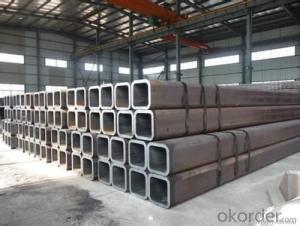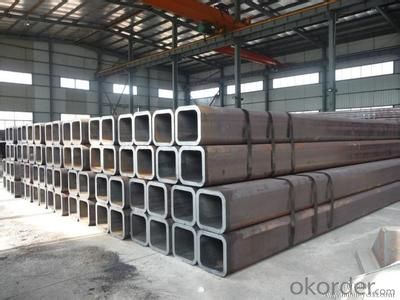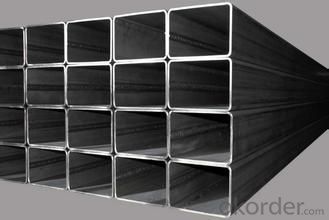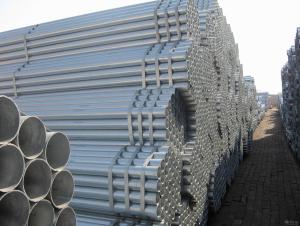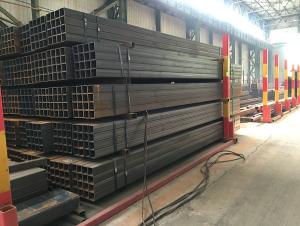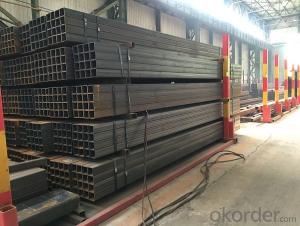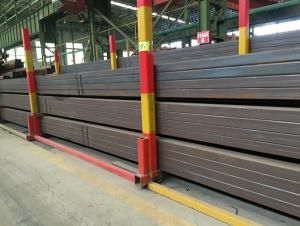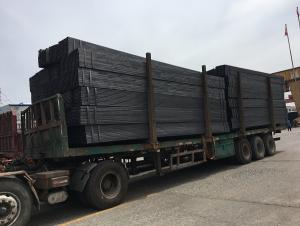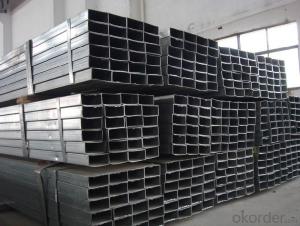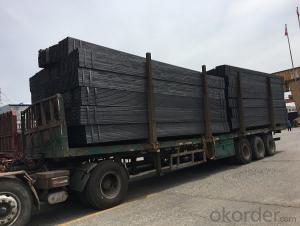With the Rectangular Tube Multifunctional Structure for Frozen Food
- Loading Port:
- Tianjin
- Payment Terms:
- TT or LC
- Min Order Qty:
- 10 m.t.
- Supply Capability:
- 3000 m.t./month
OKorder Service Pledge
OKorder Financial Service
You Might Also Like
Product Details
Product Name | rectangular hollow section/ RHS | |
Size | Size: | 10*10--500*500mm |
Thickness: | 0.45--16mm | |
Length: | 3-12m | |
Steel Grade | Q195,Q215,Q235,Q345,16Mn, 20# | |
Standard | ASTM A500,EN10219,GB/T6728,GB/T6725,JIS G3466 | |
Usage | 1. For Structure, Airport, Railway 2. Construction and so on. | |
Ends | Plain end or By Your Choice | |
Surface | Bared Or With Oiled Or Galvanized | |
Technique | ERW ,Hot Rolled and Cold Rolled | |
Section Shape | Rectangular | |
Inspection | With Hydraulic Testing, Eddy Current , Infrared Test | |
Package | Bags, Bundle, In Bulk, Containers | |
MOQ | 20 Metric Ton / Can Be Negotiated | |
Supply Ability | 15,000 Metric Ton/Month | |
Date of Delivery | 7 days(Qty within 1000 Metric Ton) or According To The Quantity | |
Port of Shipment | Tianjin, China | |
Payment | L/C T/T | |
Packaging & Delivery
Packaging Details: | seaworthy package,bundles wrapped with strong steel strip |
Delivery Detail: | 15-30days after received 30%TT |
FAQ of Rectangular Tube:
①How is the quality of your products?
Our products are manufactured strictly according to national and internaional standard, and we take a test on every pipe before delivered out. If you want see our quality certifications and all kinds of testing report, please just ask us for it.
Guaranteed: If products’ quality don’t accord to discription as we give or the promise before you place order, we promise 100% refund.
②How about price?
Yes, we are factory and be able to give you lowest price below market one, and we have a policy that “ for saving time and absolutely honest business attitude, we quote as lowest as possible for any customer, and discount can be given according to quantity”,if you like bargain and factory price is not low enough as you think, just don’t waste your time.Please trust the quotation we would give you, it is professional one.
③Why should you chose us?
Chose happens because of quality, then price, We can give you both.Additionally, we can also offer professional products inquiry, products knowledge train(for agents), smooth goods delivery, exellent customer solution proposals.Our service formula: good quality+good price+good service=customer’s trust
SGS test is available, customer inspection before shipping is welcome, third party inspection is no problem.
Any question, pls feel free to contact us !
Rectangular Tube Images:
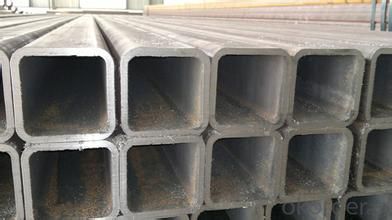
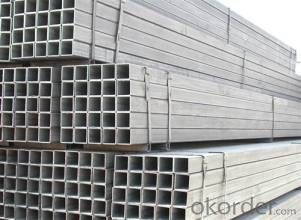
- Q: Can steel pipes be used for underground stormwater systems?
- Yes, steel pipes can be used for underground stormwater systems. Steel pipes are known for their durability and strength, making them suitable for withstanding the pressure and weight of underground stormwater systems. Additionally, steel pipes have a high resistance to corrosion, which is important when dealing with stormwater that may contain various contaminants. However, it is important to properly coat and protect the steel pipes to prevent any potential corrosion or damage over time. Regular maintenance and inspections should also be carried out to ensure the integrity of the steel pipes and the overall performance of the underground stormwater system.
- Q: How are steel pipes used in the manufacturing of scaffolding?
- Steel pipes are commonly used in the manufacturing of scaffolding as they provide a strong and durable framework. They are used to create the main structure of the scaffolding, providing support and stability for workers and materials. The pipes are typically joined together using fittings, allowing for easy assembly and disassembly of the scaffolding system. Additionally, steel pipes can be easily adjusted to different heights and configurations, making them a versatile choice for scaffolding construction.
- Q: Can steel pipes be used for underwater applications?
- Yes, steel pipes can be used for underwater applications. Steel is a strong and durable material that can withstand the harsh conditions of underwater environments, making it suitable for various applications such as offshore oil and gas exploration, underwater construction, and marine infrastructure. Additionally, steel pipes can be coated with protective layers to prevent corrosion and ensure long-term performance underwater.
- Q: What are the factors that affect the lifespan of steel pipes in different environments?
- The factors that affect the lifespan of steel pipes in different environments include the pH level of the surrounding soil or water, presence of corrosive chemicals, humidity and moisture levels, exposure to extreme temperatures, mechanical stress or pressure, and the quality of protective coatings or corrosion inhibitors applied to the pipes.
- Q: Is there a weld on the outer wall of seamless steel tube?
- Seamless steel pipe's inner wall, outer wall, section, cross section can not see the weld seam. Because seamless steel pipe is a molding product, no late roll pressure, welding and other processes. No section, inner wall, outer wall or section, as long as there is weld, it is not seamless steel tube. The inner wall can not see the outer wall of welding seam, but it can be seen that the weld products are fake or polished goods. Some products can not be seen without friction and have weld seams on the outside wall. They are seamless treated steel tubes and are polished goods. The price is much different from the real seamless steel tube. Some bad wounding, confusing concepts, earn illegal profits.
- Q: What is the outer diameter of the steel tube?
- The diameter of a steel pipe refers to the diameter of the steel pipe. The specifications of the steel tube is normal with diameter (diameter and thickness) said, for example 100MM outer diameter and wall thickness of 5MM tube is marked with 100*5.
- Q: How are steel pipes protected against mechanical damage?
- Steel pipes are protected against mechanical damage through various methods such as applying coatings, using protective sleeves or wraps, implementing proper handling techniques, and employing impact-resistant materials in high-risk areas.
- Q: Are steel pipes suitable for pharmaceutical manufacturing facilities?
- Indeed, steel pipes prove to be a fitting option for pharmaceutical manufacturing facilities. Their outstanding resistance to corrosion and durability make them a prevalent choice in this industry. They are capable of enduring high levels of pressure and temperature, rendering them perfect for a wide range of purposes, including fluid, gas, and chemical transportation within the facility. Moreover, steel pipes possess the advantage of effortless cleaning and sanitization, guaranteeing the preservation and safety of pharmaceutical products. Additionally, they offer cost-effectiveness and boast an extended lifespan, solidifying their status as a dependable choice for pharmaceutical manufacturing facilities.
- Q: Can steel pipes be recycled after their useful life?
- Yes, steel pipes can be recycled after their useful life. Steel is a highly recyclable material, and this includes steel pipes. Recycling steel pipes involves collecting the used pipes, cleaning them to remove any contaminants, and then processing them into new steel products. The recycling process helps to conserve natural resources, reduce energy consumption, and minimize waste. Additionally, recycling steel pipes helps to reduce the environmental impact associated with the production of new steel.
- Q: What are the different types of steel pipe coatings for offshore applications?
- There are several types of steel pipe coatings that are commonly used for offshore applications. Some of the most common types include fusion bonded epoxy (FBE) coating, three-layer polyethylene (3LPE) coating, and three-layer polypropylene (3LPP) coating. FBE coating provides excellent corrosion resistance and is often used in subsea pipelines. 3LPE coating combines fusion bonded epoxy with an adhesive and a high-density polyethylene layer, offering superior mechanical protection and corrosion resistance. 3LPP coating, on the other hand, combines fusion bonded epoxy with an adhesive and a polypropylene layer, providing enhanced resistance to high temperatures and chemicals. These coatings help to protect steel pipes from corrosion, abrasion, and other environmental factors, ensuring their durability in offshore environments.
Send your message to us
With the Rectangular Tube Multifunctional Structure for Frozen Food
- Loading Port:
- Tianjin
- Payment Terms:
- TT or LC
- Min Order Qty:
- 10 m.t.
- Supply Capability:
- 3000 m.t./month
OKorder Service Pledge
OKorder Financial Service
Similar products
Hot products
Hot Searches
Related keywords
